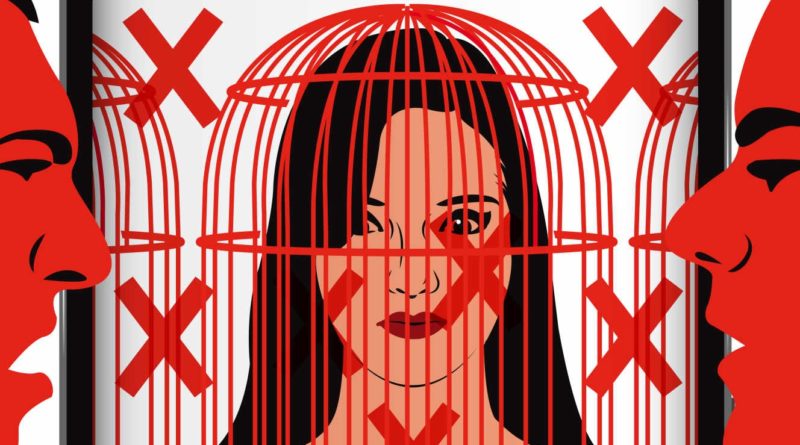French senate report seeks « to cause shockwaves » in porn industry
On Wednesday, four female senators will present the first parliamentary report on pornography, calling for tighter regulation of the industry.
By Samuel Laurent, on September 28, 2022.
« The first time I have worked on a subject on which there are no institutional documents, no report, nothing. » And according to Laurence Rossignol, Socialist vice president of the French Sénat and rapporteur, along with three other members of the chamber’s women’s rights delegation (senators Annick Billon, Alexandra Borchio-Fontimp and Laurence Cohen) of the first parliamentary report on the porn industry, the lack of interest in the subject is no coincidence. « There is a lot of male resistance to making these kinds of topics political issues. »
The four female rapporteurs, from different points on the political spectrum, present a united front in the document, which is to be published on Wednesday, September 28 after six months of work and dozens of hearings. As they point out in their foreword, their aim is « to finally open everyone’s eyes to this system of violence », as exemplified by the far-reaching « French Bukkake » scandal, named after a website by Pascal Ollitrault. A judicial investigation was opened into the website in October 2020, for « aggravated trafficking human beings, gang rape and aggravated pimping ». The rapporteurs also want « to initiate a public debate on the practices of the porn industry and on its very existence ».
Pornography has long since spread beyond the confines of movie theaters, and is no longer seen as a symbol of the liberalization of morals. The Internet has profoundly transformed both production and consumption, which has become as massive as it is precocious: « two-thirds of children under 15 and one-third of those under 12 have already been exposed to pornographic images, voluntarily or involuntarily. Nearly a third of boys under 15 years old visit a porn site at least once a month, » the report noted. This has profound consequences on mental health and on how sexuality and women are perceived.
« Stop looking away »
« What we want to say, » summarized Ms Rossignol, « is that the porn industry is toxic in the way it is manufactured as well as in its consumption. It colonizes minds. » The authors of the report said, « We must realize that this is a public policy problem. We have to stop looking the other way ». In France, the audiovisual and digital communication regulation authority (ARCOM) estimates that 19.3 million people (a third of internet users) watch porn online, with minors accounting for 12% of this audience.
While this opening up of the market has benefited a few large companies- primarily the Canadian giant MindGeek, which owns Pornhub, Redtube and YouPorn, and in France, the Ares group (behind website Jacquie et Michel) and Dorcel- it has also led to a massive increase in the precariousness of the industry’s other stakeholders, first and foremost the actresses.
The porn industry has long since abandoned its artistic pretensions and instead has progressively split itself into niches corresponding to consumers’ expectations. The most popular is « gonzo » or « hardcore », where the script is dropped in favour of violent practices: insults, humiliation, beatings, strangulation…
« Writing rape into screenplays and eroticizing sexual violence participates (…) in this system of domination and violence against women, » wrote the rapporteurs, who cite several studies showing that these practices feature in 90% of pornography consumed. « Ethical » does not exist, but it represents 0,001% of the market, it’s not what consumers are looking for », noted Ms Rossignol.
Within « hardcore » porn, a substantial number of the productions are labelled « amateur », in which the women are not professional actresses but rather « occasional participants », as the Ares group modestly described in its responses. The group claims to be a simple distributor, insisting it is not responsible for conditions during film shoots. The rapporteurs roundly refute this « cynical » argument, saying that « the status of simple distributor does not exonerate the directors of the Ares group of their responsibilities towards the presumed victims of productions broadcast on the websites owned by the group. » They note the absence of any statute or employment contracts for porn actresses, who most often have to be happy with a simple document signing over rights to their image. An image which, once filmed and broadcast, is difficult to remove, and sometimes the producers demand large sums of money in exchange for the withdrawal of the video.
The rapporteurs’ goal is to « cause shockwaves » in the industry. In the report, they put forward 20 proposals, including strengthening ARCOM’s powers so that it can report and administratively sanction offending sites; tightening are control for users; and empowering individuals who have been filmed to get their videos removed more easily. But they go further, asking in their conclusions if it is reasonable to « continue to tolerate the existence of an industry that generates such violence and abuse against women (…), which can have disastrous consequences on the construction of the sexual identity of young consumers. »
Samuel Laurent

